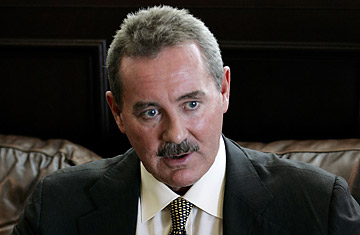
Texas billionaire R. Allen Stanford
(2 of 2)
The reason for the sudden deluge of these crimes, according to Stephen Obie, acting director of enforcement for the CFTC, is that hard economic times are stripping away fraudsters' camouflage. And, of course, Bernard Madoff's stunner, a $50 billion Ponzi that wiped away billions of dollars from thousands of duped investors around the world, has brought global attention to Ponzi capers, encouraging both whistle-blowers and just plain nervous investors to come forward, he said. (See pictures of Madoff.)
Last week, Obie uncovered two Ponzis in the $30 million range. Once considered a good size, the amount now barely raises an eyebrow. The CFTC, a sister agency to the SEC, handles commodities, futures and foreign-exchange regulation and fraud. A Ponzi is a fraud in which money from new investors is used to pay off previous investors.
The CFTC filed a complaint against Mark S. Trimble of Edmond, Okla., and his company, Phidippides Capital Management, for running a private hedge fund alleged to be a $30 million Ponzi. Before that, Obie and his enforcement team filed an enforcement action against Charles E. Hays and his Crossfire Trading of Rosemount, Minn., charging fraud and misappropriation in connection with a $25 million Ponzi that affected 75 people.
In the Oklahoma case, the CFTC's complaint alleges that, beginning in 2005, Phidippides Capital operated a $34 million hedge fund with approximately 60 investors. Since at least October 2007, the CFTC says, Trimble allegedly issued "false account statements, failed to disclose the fund's actual multimillion trading losses and operated the fund as a Ponzi scheme."
Trimble allegedly received more than $1 million in management fees based on false reports of trading profits. Trimble's lawyer, Mack Martin, said Trimble is cooperating with the CFTC but made no further comment.
In the Minnesota case, the CFTC complaint charges Hays with misappropriating investor funds to purchase a $4 million yacht, among other things. Hays could not be located for comment. "Hays ran his Ponzi scheme from his yacht but was grounded when the tide turned as federal authorities exposed this egregious fraud," said Obie in a prepared statement. When asked why the Ponzi surge is so great now, Obie said, "What you're seeing is the collapse of Ponzi funds in hard economic times — but I'm afraid as times get tougher, we're going to see new fraud develop, especially foreign-currency fraud."
Given his enforcement staff of 110 people, Obie said he relies as much on whistle-blowers and insiders as he does on his own force. "Over 50% of our cases come from insiders or victims, but by then it's usually too late; the damage is done," he said. "Look, we need the victims to prosecute the case. Victims calling us is crucial for our work."
Last month, Obie guessed that his Ponzi caseload would hit about one per month, but he later increased that prediction to two a month. With six such cases in the first 45 days of the year, it looks to be an easy target to hit.
"We're trying to create outreach to investors to be on the lookout for this kind of fraud, to call us," Obie said. "The lessons we've learned from Madoff are twofold. First, no matter how reputable the firm or individual is — and Madoff was highly reputable — you have to check them out. And second, as an agency, we have to follow up on every allegation, no matter who calls it in or how unsubstantiated it might be."
